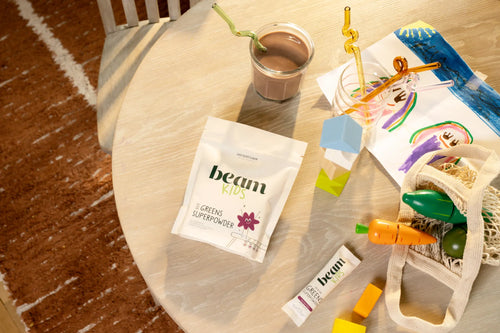How to Calm Anxiety
Anxiety can feel like a constant (unwanted) companion that’s hard to shake. It often gets brushed off as “just nervousness,” but the truth is anxiety is a complex emotion that affects many aspects of life.
It can make you feel out of control, but the good news is you have the power to regain that control. Calming anxiety isn’t about eliminating it completely—it’s about learning how to manage it in ways that allow you to feel more centered, confident, and in charge of your own emotional well-being.
Calming supplements are designed to help you find balance and maintain focus, supporting your body’s ability to rest and recharge. By embracing small, consistent changes and incorporating techniques that work for you, anxiety no longer has to control your life.
Understanding Anxiety and Its Triggers
It's normal to feel anxious: it's our body's natural response to stress, but when it takes over, it can interfere with everyday life. The first step in managing anxiety is understanding what it is and what triggers it.
Recognizing the signs and sources of your anxiety can empower you to navigate through it with confidence. By identifying these factors, you can implement strategies to create a calmer, more balanced life.
What Is Anxiety?
Anxiety is more than just feeling stressed or worried. It's a persistent sense of unease or fear, often with no clear cause. While anxiety is a normal part of life, acting as a natural signal to potential threats, it becomes a problem when it’s constant or overwhelming.
It can negatively affect your mental state and show up physically—your heart races, your breathing quickens, and focusing can become challenging.
Understanding anxiety means seeing it as a complex response that involves both the mind and body. It’s influenced by many factors, from genetics and brain chemistry to life experiences and even lifestyle choices. Hormonal imbalances or a lack of key nutrients might also contribute. Recognizing these facets of anxiety helps you approach it in a more holistic way.
Learning about anxiety helps demystify the condition and removes the stigma. When you accept anxiety as an ordinary human experience, it becomes easier to manage. This self-awareness is the first step in calming anxiety naturally and effectively.
Common Causes of Anxiety
Anxiety can be triggered by many different factors. Common causes include stress from work, relationships, or financial concerns. Major life changes, such as moving, starting a new job, or experiencing loss, are also significant triggers.
Environmental factors, like crowded spaces or too much noise, can amplify anxious feelings. Lifestyle choices such as an unhealthy diet, lack of sleep, and excessive caffeine or sugar intake can also worsen anxiety symptoms. Identifying these triggers gives you the power to make conscious adjustments to reduce their impact.
In some cases, anxiety may be linked to deeper issues, like past trauma or ongoing health problems. If this is the case for you, seeking professional guidance can provide valuable support.
However, for many people, building healthy habits and routines can significantly ease anxiety. By pinpointing the specific factors that trigger your anxiety, you can take targeted steps to manage and reduce it.
Natural Techniques to Relieve Anxiety
Managing your anxiety naturally empowers you to take charge of your well-being without solely relying on medication.
Practices like deep breathing, mindfulness, physical activity, and proper nutrition are effective, accessible ways to calm your anxiety.
Deep Breathing Exercises
Deep breathing is one of the simplest and most effective ways to calm anxiety. When you focus on your breath, you activate your body’s relaxation response.
This helps slow your heart rate and lower blood pressure, which can counteract the physical symptoms of anxiety. Diaphragmatic breathing—breathing deeply into your belly instead of shallowly into your chest—is a powerful technique.
To practice diaphragmatic breathing:
- Sit comfortably and place one hand on your chest and the other on your stomach.
- Inhale slowly through your nose, letting your stomach rise while your chest stays still.
- Exhale gently through your mouth.
- Repeat this for several minutes, focusing on the sensation of your breath entering and leaving your body.
Deep breathing not only soothes the mind but also improves oxygen flow, which boosts your overall well-being. It’s a portable technique you can practice anytime, anywhere, whether at work, at home, or on the go. By making it a regular practice, you can manage anxiety whenever it arises.
Mindfulness and Meditation Practices
Mindfulness and meditation help train your mind to stay grounded in the present moment. This reduces the tendency to ruminate on the past or worry about the future—common triggers for anxiety. Mindfulness is about observing your thoughts and feelings without judgment, allowing you to experience anxiety without becoming overwhelmed by it.
Start by dedicating a few minutes each day to mindfulness:
- Find a quiet space and sit comfortably.
- Close your eyes and focus on your breath, the sensations in your body, or the sounds around you.
- If your mind wanders, gently bring your focus back to your breath.
- Use guided meditation apps if you’re new to the practice.
Regular meditation helps lower stress hormones and promotes feelings of calm and happiness. Over time, it can rewire your brain, making it easier to manage anxious thoughts. You can also incorporate mindfulness into everyday activities, like eating or walking, for added benefits.
Physical Activity
Physical activity is one of the most natural ways to combat anxiety. Exercise releases endorphins, your body’s natural mood boosters, which help reduce stress and improve your overall well-being.
Activities like walking, yoga, swimming, or cycling can be particularly effective due to their calming, repetitive movements.
Regular exercise enhances sleep quality, boosts energy, and builds self-esteem—all important factors in reducing anxiety. Even a short 10-minute walk can clear your mind and ease tension. Finding an activity you enjoy is key to staying consistent.
Whether dancing, hiking, or playing sports, choose something that brings you joy and makes you feel good.
The Role of Nutrition
What you eat can play a major role in managing anxiety. A balanced diet rich in whole grains, lean proteins, fruits, and vegetables supports brain health and helps regulate mood. Certain nutrients, like omega-3 fatty acids found in fish, have been linked to a reduction in anxiety.
Limiting stimulants such as caffeine and sugar is also important. While they may provide a temporary boost, they can lead to crashes that worsen anxiety. Staying hydrated and maintaining balanced blood sugar levels are essential for keeping mood swings and anxiety at bay.
Consider incorporating foods that promote relaxation, such as chamomile or green tea, both of which contain calming compounds. Supplements can also support your nutritional needs. For example, Beam offers natural supplements that can help support focus, rest, and overall wellness.
Lifestyle Changes for Anxiety Management
Making intentional lifestyle changes can have a powerful effect on your anxiety levels. By prioritizing sleep, managing stimulants, and building a supportive social network, you lay the groundwork for emotional stability and a calmer mind.
These changes are practical and easy to incorporate into daily life, fostering lasting well-being.
Importance of Sleep
Sleep is one of the most powerful tools for managing anxiety. When we sleep, our bodies repair themselves, and our minds process emotions and memories. Without enough sleep, these restorative processes are disrupted, which can lead to increased stress and difficulty handling daily challenges.
Aim for 7-9 hours of quality sleep each night to help regulate your body’s internal clock. Keep your bedroom dark, quiet, and cool to improve your sleep environment. Avoid screens for at least an hour before bed, as the blue light can interfere with the production of sleep hormones.
If you struggle to fall asleep, establish a calming bedtime routine. Reading, gentle stretching, or a warm bath can signal to your body that it's time to wind down. You might also consider natural sleep aids, like a sleeping powder, which can promote relaxation and improve sleep quality, reducing anxiety.
Limiting Stimulants like Caffeine and Sugar
Caffeine and sugar can exacerbate anxiety symptoms. Caffeine stimulates the nervous system, which can lead to feelings of jitteriness and heightened alertness—symptoms that are often mistaken for or worsen anxiety. Sugar can also cause spikes and crashes in blood sugar levels, contributing to mood swings and irritability.
To help stabilize your system, consider reducing your coffee, energy drinks, and sugary snack intake. Opt for decaffeinated beverages or soothing herbal teas like chamomile or peppermint, both known for their calming properties. When you’re craving something sweet, reach for fruits instead of processed sugar—fruit provides natural sweetness along with beneficial fiber and nutrients.
Pay attention to how these substances affect your anxiety. Reducing your intake gradually can help minimize withdrawal symptoms. By moderating stimulants, you create a more balanced foundation, which makes it easier to manage anxiety.
Building a Supportive Social Network
A strong social support system is an important part of coping with life and its challenges. Spending time with friends, a family member, or a support group creates a sense of belonging and reassurance. Sharing your thoughts and feelings with trusted people can lighten the emotional load of anxiety and offer fresh perspectives.
Focus on relationships that uplift you. Take part in activities that bring you joy and relax you, whether it’s socializing with loved ones, joining a hobby group, or volunteering. These connections reduce feelings of loneliness and provide emotional relief.
And remember—it's okay to ask for help. Simply talking about how you feel can provide immense comfort and release. Having a reliable support network acts as a safety net, offering comfort and encouragement as you manage your anxiety.
Natural Supplements and Remedies
Incorporating natural supplements and remedies into your routine can offer additional support in calming anxiety. Certain herbs, essential oils, and natural products have been used for centuries to promote relaxation and reduce stress.
These remedies can complement other anxiety management strategies, giving you a well-rounded approach to feeling your best. Let’s dive into some options that might benefit you.
While natural supplements and remedies are not meant to replace professional treatment, they can work alongside other techniques to help manage anxiety. Many of these options come with fewer side effects than pharmaceutical treatments. Still, using them responsibly and consulting with a healthcare provider is important, especially if you’re on other medications.
Herbal Anxiety Supplements
Herbal supplements have been trusted for their calming effects for centuries. Some of the most popular options include:
- Ashwagandha: This herb is known for its ability to help the body manage stress, support the adrenal glands, and balance cortisol levels.
- Valerian Root: Often used to improve sleep quality, valerian root has a calming effect that may help reduce anxiety symptoms.
- Passionflower: This plant is believed to ease anxiety, promoting a sense of calm by supporting the nervous system.
Before incorporating any new supplement, speaking with a healthcare professional is important, particularly if you’re taking other medications. Quality matters—always choose reputable brands with clear ingredient lists and third-party testing for purity and potency.
For example, Beam offers high-quality, natural supplements designed to support wellness, focusing on clean, effective ingredients. Their products are a great addition to your natural approach to managing anxiety.
Essential Oils and Aromatherapy
Aromatherapy is another effective natural remedy for anxiety. Essential oils like lavender, chamomile, and bergamot have soothing properties that can help reduce stress. These oils can be used in various ways:
- Diffusers: Add a few drops to a diffuser to fill the room with calming scents.
- Baths: Adding essential oils to your bath can promote relaxation and ease muscle tension.
- Topical Application: When diluted with a carrier oil, essential oils can be applied directly to the skin, such as on your temples or wrists.
Inhaling calming scents signals your brain to relax, which can reduce the physical symptoms of anxiety, like tightness in the chest or shallow breathing. Creating a calming environment with these aromas in your space can contribute to a sense of peace.
Make it part of your daily routine to get the most out of aromatherapy. Whether during meditation, before bed, or throughout the day, essential oils provide a gentle and natural way to ease anxiety.
Calming Tea Blends
Green tea and chamomile are two popular drinks that offer natural compounds beneficial for anxiety management.
- Green Tea: Rich in L-theanine, an amino acid known to promote relaxation without causing drowsiness, green tea can help you stay calm and focused throughout the day.
- Chamomile Tea: Chamomile is often used as a remedy for anxiety and insomnia. It contains antioxidants that may help reduce inflammation, relax the muscles, and promote a sense of calm.
Incorporating these teas into your routine is simple and effective. Start your morning with a cup of green tea to boost calm alertness, and wind down in the evening with chamomile tea to relax before bed. These teas are an easy yet powerful way to support your natural approach to calming anxiety.
When to Seek Professional Help
While natural methods can play a significant role in reducing anxiety, there are times when seeking professional help is necessary. Recognizing when anxiety begins to impact your daily life is key. Professional support can provide additional resources and strategies to manage an anxiety disorder effectively, ensuring you don’t have to face the journey alone.
Signs It's Time to Consult a Mental Health Professional
If you have intense anxiety that begins to feel overwhelming or doesn't improve despite your best efforts, it may be time to seek professional assistance. Some signs to watch for include:
- Constant worry: When worry dominates your thoughts and interferes with work, relationships, or day-to-day life, it’s a signal that anxiety is taking a bigger toll.
- Physical symptoms: Panic attacks, persistent headaches, or ongoing insomnia that doesn’t improve with self-care should not be ignored.
- Coping with substances: If you find yourself relying on alcohol, drugs, or other substances to manage anxiety, it’s important to reach out for professional help.
- Feelings of depression or self-harm: If anxiety is accompanied by depression or thoughts of self-harm, it’s essential to seek immediate support.
Seeking help is a sign of strength, not weakness. Professionals can offer you the tools and strategies tailored to your needs, ensuring a more effective path to recovery and improved quality of life.
Combining Natural Methods with Professional Guidance
The most effective approach to managing anxiety combines natural remedies with professional support. Therapy can introduce valuable techniques like cognitive-behavioral therapy (CBT), which helps reframe negative thought patterns and behaviors. When paired with practices like mindfulness, exercise, or relaxation techniques, CBT can significantly reduce anxiety.
In some cases, medication may also be prescribed to stabilize symptoms, making engaging in other treatments and lifestyle changes easier. If you're using natural remedies like supplements or essential oils, discussing them with your healthcare provider to ensure they fit safely into your treatment plan is important.
Embracing a Balanced Approach to Anxiety Management
Calming anxiety naturally involves more than just one approach—it’s about taking a holistic view that addresses the mind, body, and lifestyle.
By understanding the root causes of your anxiety, exploring natural techniques, making lifestyle changes, and incorporating supportive supplements, you’re actively working towards relief. Keep in mind that change takes time, and consistency is key. These methods may not show instant results, but they can make a meaningful difference with patience.
If you’re looking to enhance your anxiety management routine with natural supplements that support calm and relaxation, check out Beam’s range of clean, effective products. Their thoughtfully crafted supplements are designed to help you on your journey to emotional well-being, naturally. Start your path to calm today with Beam.
Frequently Asked Questions (FAQs):
What is the 3-3-3 rule for anxiety?
The 3-3-3 rule is a grounding technique that helps shift your focus away from anxiety. To practice it, observe three things you can see, three things you can hear, and three things you can move or touch. This method brings your attention to the present moment, helping calm anxious thoughts.
How do I get my anxiety down fast?
To quickly reduce anxiety, try deep breathing exercises—focus on slow, deep inhales and exhales. Talking to someone you trust can also help. Physical activities like walking, stretching, or even a few minutes of mindfulness, focusing on your immediate surroundings, can reduce anxiety symptoms quickly.
What is the 5-5-5 rule for anxiety?
The 5-5-5 rule is another grounding technique. Breathe in deeply for 5 seconds, hold your breath for 5 seconds, and exhale for 5 seconds. Afterward, identify five things you can see, five sounds you hear, and five objects you can touch. This technique helps refocus your mind and ease anxiety.
How do you deal with severe anxiety?
Managing severe anxiety often requires a multi-faceted approach. Regular mindfulness and relaxation techniques are essential, along with a consistent exercise and sleep routine. Therapy or counseling can provide professional support. Avoiding stimulants like caffeine and alcohol and learning to identify your anxiety triggers can also help. For severe cases, seeking professional help is often necessary for effective treatment.




